Can cats eat hummus? The short answer is no. Sadly, hummus, being the most loved Middle Eastern dip, does no good to cats! One of its main ingredients contains garlic! Yes, garlic. Only a person who spends hours on the internet will know that garlic tops the list of foods you should never give to your cats!
So before taking the bowl full of hummus near your cat, think twice! As you don’t want to spend hours cleaning her litter box from diarrhea she gets after eating it.
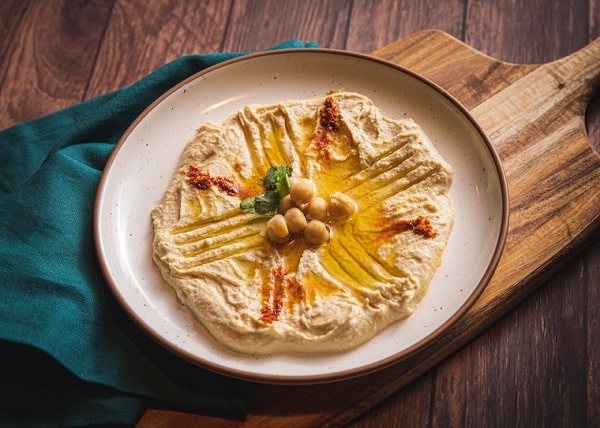
Can Cats Have Hummus?
The short answer is No, cats can’t safely eat Hummus. In fact, hummus is very toxic for cats. Ingredients like garlic and chickpeas which are hard for your cat to digest can be potentially toxic food. Also, hummus provides very little nutritional value to cats and should be avoided.
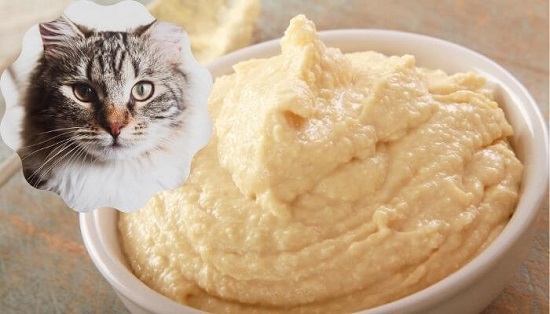
Hummus is quite popular among the peps for its health benefits, such as cutting down inflammation, improving blood sugar control, promoting digestive health, lowering the risk of heart disease, and weight loss.
These are some great effects on humans! But wait, don’t move that bowl full of hummus towards your cat!
They are not that beneficial for cats, as the main ingredients of hummus are as such, which can be a task for cats to digest, giving them health problems. So no! Cats can’t eat hummus!
Ingredients which make Hummus Toxic
A middle Eastern dip, hummus which is also very rich in nutrition, is such a popular food that it has its day, know as International Hummus Day which is celebrated on May 13. Cat owners can find themselves in deep jeopardy, as hummus is the most common food. It can be extremely hard for us, to stop your cat from having a pawful of hummus!
But few ingredients make it toxic for cats to be consumed. A major amount of garlic is very toxic for them, it has several side effects on cats.
Let’s examine deeply the ingredients of hummus, which are toxic to cats:
1. Chick Peas
Can cat eat chickpeas? Which is also known as garbanzo beans, are versatile beans that may be used in salads, soups, and a variety of other meals.
Chickpeas are the main ingredient in hummus. Even though they are high in protein, have little flavor, and have a pleasant texture, chickpeas aren’t safe for cats or any other legume they are just empty calories.
The reasons for this are that they are high-protein foods. Most vets suggest that any type of beans is not suitable for cats. It might disturb your cat’s stomach, vomiting, or diarrhea because it is not easy to digest. As hummus is incomplete without chickpeas, so there is no other alternative.
Seed pods in chickpeas involve oxalic acid that disturbs the skin that can ultimately prompt rashes whenever given ceaselessly. Consequently, be cautious about such ingredients, which can be harmful to your cats.
2. Sodium
Salt, while generally utilized for cooking in the kitchen, is very noxious to felines.
The utilization of salt to instigate spewing in felines is presently not the norm of care and isn’t suggested for use by pet proprietors or veterinarians. In case your feline’s sodium level surpasses 160 milligrams for each deciliter of blood, your veterinarian will determine your feline to have hypernatremia.
It tends to be dangerous for cats with lacking water consumption.it raises the risk of dehydration in them.
Your cats get dehydrated, they often feel the need to drink water more frequently, and apparently, that will make them use the litter box frequently.
3. Sesame Paste
Sesame paste, popularly known for its topping qualities, when it comes to safety, they are partially safe for cats. In any case, you ought to be cautious in taking care of your feline from feeding tahini or sesame seed oil, as it is not difficult to over-feed.
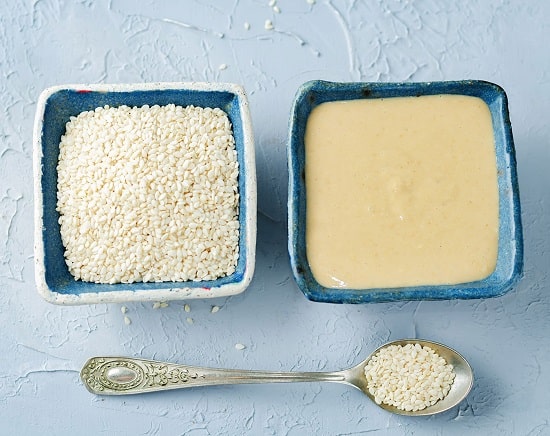
Driving your cat to ingest a lot of the oily substances. This can prompt diarrhea or stomach-related surprise, among different concerns.
A little portion should do the trick, as it is a good conductor of omega-6 fats and antioxidants, which can be beneficial for her.
If you have a cat who is pregnant, you should completely avoid it, because sesame paste increases the temperature in humans and cats. Which might be so harmful to pregnant cats! I guess everyone knows how risky it can get.
4. Hot Sauce
Unfortunately, hot sauce is present in some hummus as a taste booster, which is something that is to be avoided completely! The case is completely different where your cat comes up and licks a spoon full of hot sauce while you were busy making noodles!
Your cat will be fine after tasting a spoon full of hot sauce but only under the “accidental” circumstances, please stop yourself from adding it purposely!
Numerous hot food varieties get their seasoning from capsaicin, which can give your helpless feline plenty of stomach inconveniences, including vomiting. Your feline’s eyes may get watery, and she may have a runny nose from it as well.
5. Garlic
If you are new in the field of petting a cat, so you will go through the list of food your cat should not eat, and bravo garlic is always going to top that list. It is very toxic for your cats as they are plants of the Allium species. Let the form be any, raw, cooked, dried, it’s toxic for both cats and dogs!
Feeding your cat garlic is more harmful than any other, if the next thought you’re having after reading this, that what if you give garlic stuff in food items?
Let me stop you there, again a bad idea! As mention above, garlic is very harmful to cats in any form!
The chemical compounds in garlic enter your cats’ circulatory system and start to break red platelets, which will rapidly prompt hemolytic paleness, an exceptionally perilous condition. You might notice symptoms as they incorporate spewing, breathing troubles, loose bowels, and pale gums.
6. Fresh-Squeezed Lemon Juice
Citrus even in small amounts is toxic to cats. Lemons, oranges, lime, and like are popular for their citrus levels. Vomiting, diarrhea, drooling, and weakness are the symptoms your cats might face as it digests even the tiniest drops of lemon, or any other fruit having citrus.
7. Paprika
The appropriate response isn’t a yes or not, however, it relies upon which sort of pepper it has. Paprika produced using sweet peppers (not fiery or hot) is ok for felines, and felines can eat it whenever utilized in feline-safe home food sources. Be that as it may, in case it is hot, i.e., it has capsaicin, don’t offer it to your felines.
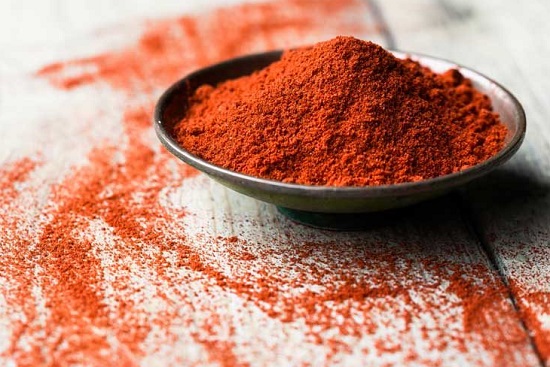
Paprika is plentiful in nutrients E, B6, and A and even contains carotenoids.
For example, the red-shaded paprika contains capsorubin as well as capsanthin, whereas the yellow-colored ones contain beta-carotene, beta-cryptoxanthin, lutein,alpha-carotene, and zeaxanthin.
8. Olive Oil
Finally, an ingredient that has some good qualities for cats, olive oil is something which is commonly found in our kitchens, it is a great source of antioxidants that help your cat to improve her immune system.
If you are a gym freak, you must be knowing the goodness of olive oil, which contains monounsaturated fat. This type of fat is good for cats too! It can prevent cats from getting diabetes and cardiovascular diseases. Your cat can also lose weight by consuming some amount of olive oil, as it helps to break down fat cells.
Including a small amount of olive oil in your cat’s diet will make her fur healthy and shiny, it also helps in curing constipation.
When Is Hummus Good for Cats?
There is no science behind the reason cats liking hummus.
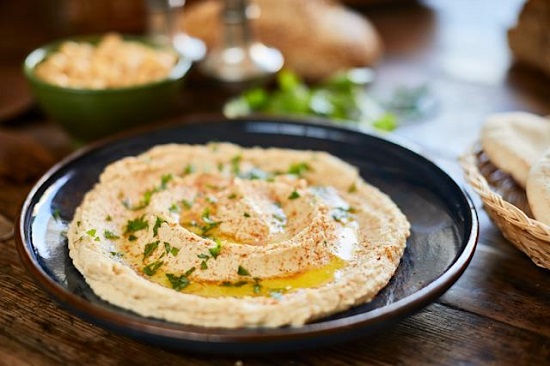
Cats can be weirdly cute, and your cat helps their curious nature. Ingredient in hummus, such as garlic, hot sauce, lemon is toxic for cats.
The only way you can make it suitable for your cat is to eliminate these toxic components.
Make cat hummus from scratch for your cat with customized ingredients. Potentially eliminate harmful substances such as garlic, hot sauce. Even after that, don’t make it a habit for cats to have hummus on multiple events. Once in a month, a scoop, or two is more than enough!
When Is Hummus Bad for Cats?
We don’t wish to get your feelings hurt, but our favorite Middle Eastern dip, no amount of hummus, is good for cats. It might be poisonous, your cat’s digestive system, if cats are interested in hummus, feeding them in any quantity is always going to be bad for your cats.
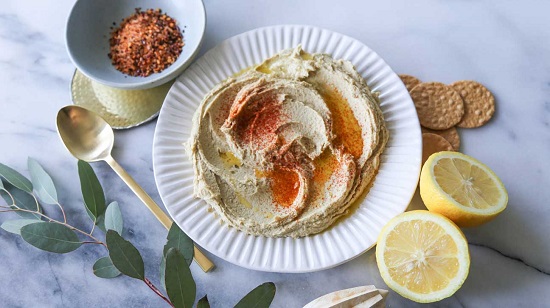
The chief component in hummus itself is hard to digest for cats.
The reasons for this are that they are high-protein foods. Most vets suggest that any type of beans is not suitable for cats.
It might disturb your cat’s stomach, vomiting, or diarrhea because it is not easy to digest. As hummus is incomplete without chickpeas, so there is no other alternative.
Now that you know can cats eat hummus, let’s learn can kitten eat hummus!
Can Kittens Eat Hummus?
A big no! Kittens should not eat hummus. A large number of ingredients such as garlic, hot sauce, lemon are very heavy for the digestive system of your kittens. They probably have zero benefits. In the case of cats, a few licks won’t harm them that much.
The case is not the same for kittens, you should probably not feed them anything which is not made up of them. As in the initial stage, you have to take proper care of the diet.
Things to Keep In Mind While Feeding Hummus to Cats
This section might not be as big as other sections, you know why because you should not consider feeding even a small amount of hummus to cats at any cost. But if accidentally you find your cat in the kitchen with an empty bowl that was filled with hummus, you might need to rush to the vet.
Let’s look into some effects on cats from ingredients use in humus
| Garlic | break red platelets, which rapidly prompt hemolytic paleness, an exceptionally perilous condition. |
| Sesame Paste | prompt diarrhea, loss of appetite, and stomach-related issues |
| Lemon Juice | drooling, weakness, diarrhea, and vomiting. |
| Hot Sauce | stomach inconveniences, vomiting, feline’s eyes may get a watery, runny nose. |
Conclusion
Hummus being one of the popular food of Middle Eastern, you might frequently see them in our household. Pet owners with cats can often find them in a situation where cats want to peep in and have a pawful of hummus. With a heavy heart, you need to prevent that from happening, as it’s not a good idea.
Making from scratch for cats by removing the toxic ingredients is the only way where your cat eats hummus. That to a few licks, not more than that.
So, can cats eat hummus? No, cats can’t safely eat hummus! Keep her away from it.
Approved by Veterinary – Dr. Anthony Brooks, DVM, Veterinarian
References
- The Nutritional Value and Health Benefits of Chickpeas and Hummus – PubMed
- Household Food Items Toxic to Dogs and Cats – NCBI
- Common cat poisons – Agriculture Victoria

